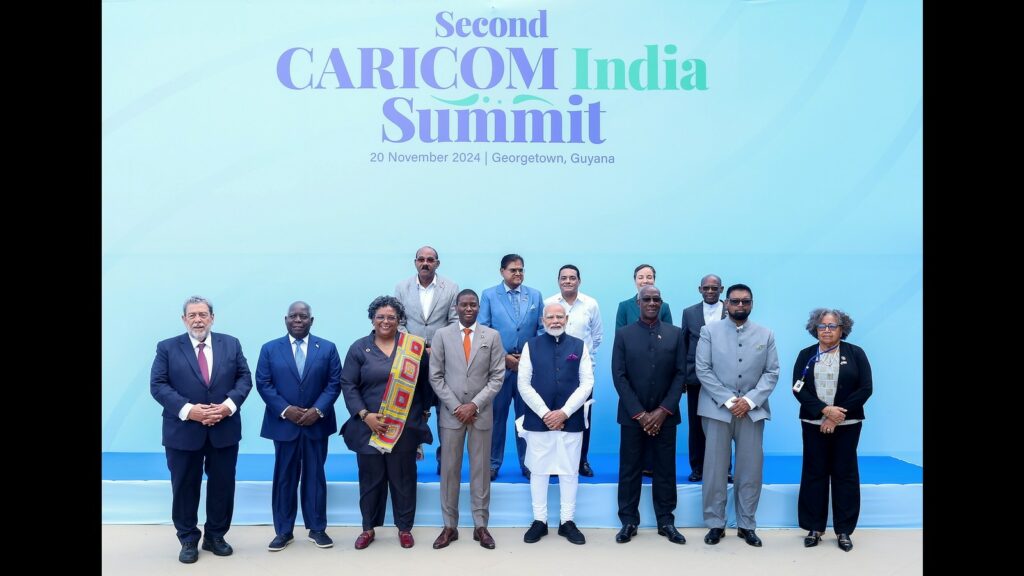Prime Minister (PM) Narendra Modi was in Rio de Janeiro earlier this week for the G20 Summit hosted by Brazil, the current president of this group. The PM attended the second Caribbean Community (CARICOM)–India Summit in Guyana on Wednesday, where he received the highest civilian honours from the presidents of both Guyana and Dominica. PM Modi’s visit follows that of the external affairs minister S Jaishankar to the region earlier this year, a series of bilateral meetings with leaders of Latin America during this year’s United Nations (UN) General Assembly in New York in September, and Argentina’s foreign minister’s visit to New Delhi in October.
As the global workplace becomes more integrated, there is an opportunity for India to leverage its strengths to provide digital services for the region (PTI)
Taken together, these engagements are a sign of India’s deepening commitment to improve and strengthen strategic and economic ties with the region where it is still playing catch up to China. In fact, Dominica’s award was a recognition of India’s “vaccine diplomacy” when it helped smaller countries acquire Covid-19 vaccines at the height of the pandemic. Those memories are still fresh and India is regarded as a partner who could be turned to in times of need. While there is a long way to go before India’s influence can match that of its northern neighbour’s, it is a step in the right direction that offers new opportunities for both bilateral, regional and multilateral cooperation.
The Rio G20 Summit demonstrated the leadership of the India-Brazil-South Africa (IBSA) troika comprising the past, present, and future rotating presidencies of the group to firmly anchor the leader’s declaration in the development objectives and priorities of the Global South. As a sign of the global ascendancy of large developing countries, the declarations adopted in Bali, New Delhi and Brasilia focused on the need to address the multiple crises facing developing countries today — sovereign debt, increasing hunger and poverty, the climate crisis, and digital divide, among others. India’s proposals during its G20 presidency, especially Mission LiFE, green climate pact and digital public infrastructure, were consolidated through Brazil’s initiatives to form a global alliance against hunger and poverty, promote the use of biofuels for the energy transition and focus on inclusive digitalisation. In the process, the two countries worked together at the bilateral level to ensure that the G20 communiqué demonstrated policy continuity within the G20, while moving the global development agenda forward.
The CARICOM summit provided India another window of opportunity to strengthen relations with a region with strong cultural and economic ties. Guyana, the host of the CARICOM-India Summit, will be a large crude oil producer over the next decades and has entered into a Memorandum of Understanding (MoU) with India for both purchase and exploration of hydrocarbons. Dominica’s recognition of India’s support during the pandemic also shows that India can call upon its goodwill to forge stronger connections providing tangible support when required, especially to mitigate the impact of the climate crisis in a particularly vulnerable region.
However, it is the countries of Central and South America to which India must direct more of its energy and attention. Unlike the Caribbean where there is a large and influential Indian diaspora, Latin America and India are separated by both geography, history and language. Less than 50,000 people of Indian origin live in Central and South America, the volume of trade is less than $50 billion, and India accounts for less than 10% of China’s foreign direct investment (FDI) in the region.
But as the world grapples with uncertainties regarding trade, investment and realignment of supply chains, it opens up opportunities for India to leverage its recent bilateral and multilateral engagements to position itself as a strong partner for the region. In an increasingly digital world where governments are trying to use technology to become more efficient in delivering public services and benefits, India’s digital transformation is garnering much attention. As the global workplace becomes more integrated, there is an opportunity for India to leverage its strengths to provide digital services for the region.
But there is much work to be done to take advantage of the opportunities that Latin America provides.
First, India’s relationship with two of the largest economies of Latin America — Brazil and Mexico — needs to be enhanced significantly. India and Brazil’s coordination over their consecutive G20 presidencies has stimulated activity both in the government and private sector. There is potential to collaborate on energy transition, especially biofuels and green hydrogen, as well as on digital public infrastructure and payment systems where the two countries are pioneers.
Second, the smaller Latin American countries could be important for India as a source of minerals needed to support energy transition, especially for electric vehicles and grid-scale battery storage. Mexico, Brazil, Colombia, Chile, and Bolivia potentially hold over half of all reserves of lithium, manganese, copper and other rare earths. India can support sustainable extraction and processing of critical minerals and invest in production facilities that would create jobs for the local population.
Finally, India needs to redouble its efforts to be a member of the Inter-American Development Bank (IDB), the largest multilateral financial institution in Latin America. India could offer IDB innovative solutions through the IDB Labs and the Amazonia initiatives. It can also support private sector investment through IDB Invest, providing an opportunity to engage in agriculture, clean energy and sustainable infrastructure. For India, IDB provides a seat at the table at an institution that determines the development trajectory of a part of the world where it is as yet a marginal actor, with ambitions to play a bigger role in the future.
Anit Mukherjee is senior fellow for economic policy at ORF. The views expressed are personal
Source link : http://www.bing.com/news/apiclick.aspx?ref=FexRss&aid=&tid=6740a3e28ea14e3e93afe3cd34f61170&url=https%3A%2F%2Fwww.hindustantimes.com%2Fopinion%2Findia-must-seize-the-opportunities-in-latin-america-101732282723047.html&c=10428387933831464545&mkt=en-us
Author :
Publish date : 2024-11-22 00:39:00
Copyright for syndicated content belongs to the linked Source.
